Uncovering the truth in the Killing Fields
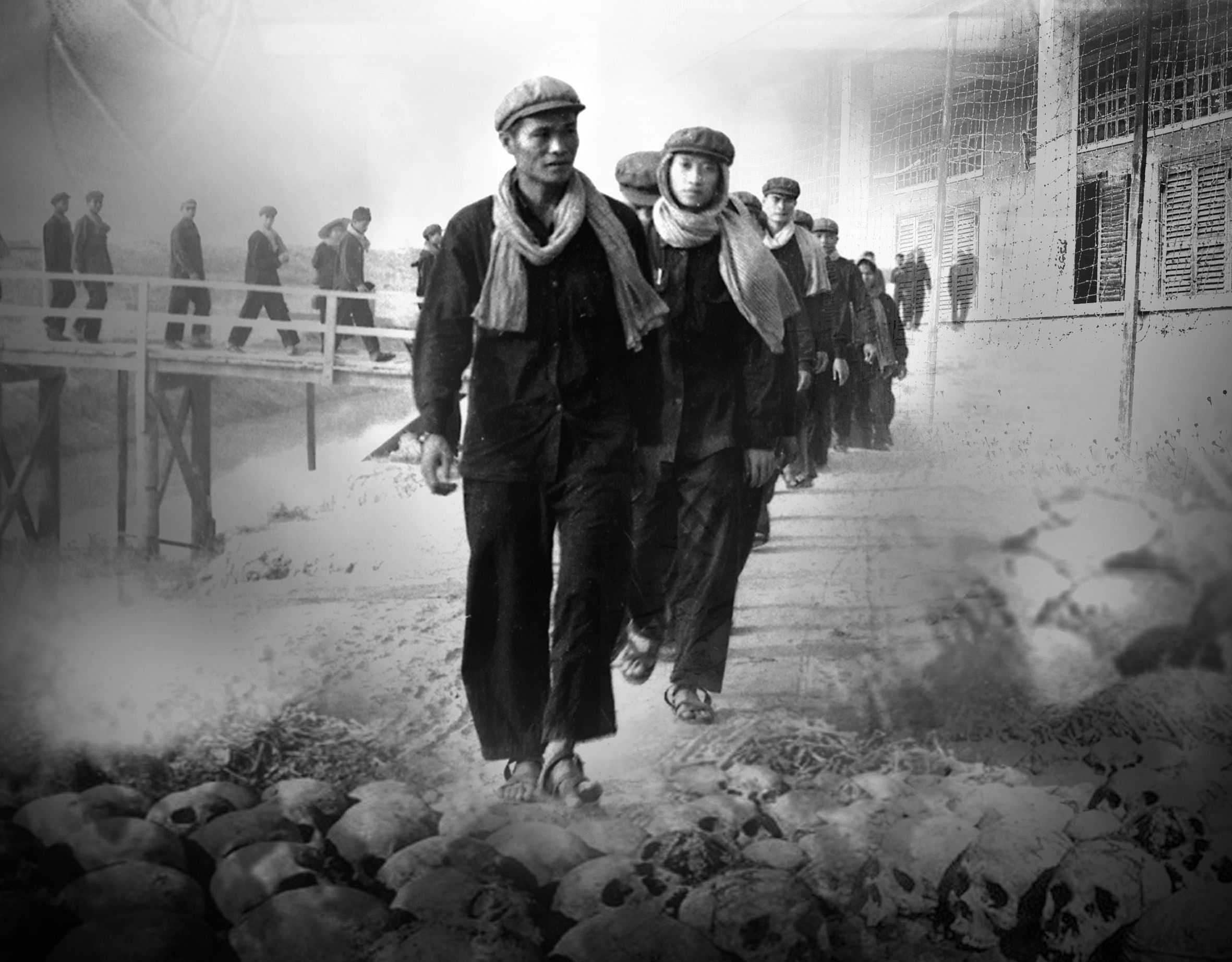
A Swiss judge, backed by the United Nations, is taking on the Cambodian government and courts to pursue alleged crimes against humanity and war crimes.
Laurent Kasper-Ansermet knows his order to resume an investigation of the Khmer Rouge that was closed last year would result in “fallout”. Nevertheless, he wants the tribunal to try five additional cases.
The UN has chosen him to replace Germany’s Siegfried Blunk as co-deputy investigating judge, although the Cambodian Supreme Court refuses to recognise this.
“I have all the authorisation required for my function as a reserve investigating judge,” Kasper-Ansermet told swissinfo.ch.
“A few weeks ago, David Scheffer [designated by United Nations Secretary-General Ban Ki-moon in January as the UN special expert to advise the international tribunal] publicly declared I could proceed.”
Blunk resigned in October after accusing the Cambodian government of interference.
“This doesn’t make the tribunal’s work any easier,” Kasper-Ansermet said. “This dispute will have fallout, including the current trials of former Khmer Rouge leaders.”
The announcement once again puts the UN and Cambodian government at odds over the operations of a court – the Extraordinary Chambers in the Courts of Cambodia (ECCC, see box) – they jointly created six years ago to deliver justice for the mass murders of the Pol Pot regime. These left an estimated 2.2 million dead between 1975 and 1979.
Mass deaths
The ECCC, which last month handed a life term on appeal to 69-year-old Kaing Guek Eav, better known as Duch, for overseeing the deaths of some 15,000 people as head of the notorious S-21 torture prison, is walking a tightrope.
While the Cambodian government in the capital Phnom Penh believes the agreement signed with the UN doesn’t authorise the ECCC to engage in new prosecutions, five middle-ranking former members of the Khmer Rouge have just been informed of the charges made against them.
One of the accused, Im Cheam, confirmed this to the Phnom Penh Post, a daily newspaper published in English and Cambodian.
Cheam, now 69 years old, is accused of supervising labour on a Khmer Rouge irrigation project at Trapeang Thma, in the northwest of the country, where people died en masse – as across Cambodia – having been forced to work without medical care or sufficient food.
Past vs future
The trials have also split ordinary Cambodians. While some call for retributive justice, others would prefer to see the money spent on the country’s future.
Film director Rithy Panh, who recently visited Geneva to pick up the main award at the International Human Rights Film Festival for his film, “Duch, Master of the Forges of Hell”, dismisses claims that the interference is because of current prime minister Hun Sen’s Khmer Rouge past.
“If Hun Sen really was opposed to this tribunal, no trial would have taken place,” he told swissinfo.ch.
He added that putting all the Khmer Rouge on trial “would take 300 years”.
“Cambodia doesn’t have the financial resources – nor does the UN – to launch new trials.”
The ECCC is always short of funds, and a recent payment of $6 million (SFr5.5 million) by main donor Japan meant 300 Cambodian employees could be paid for the first time since October. The 130 international staff receive their wages from the UN.
“If other indictments end up stretching out over years, Cambodians are going to start asking themselves why so much is being spent [on the trials] when the country is so poor,” Panh said.
Forgive and forget?
On the other hand, Mariejo Duc-Reynaert, executive secretary of the Centre for Asian Studies, at the Graduate Institute Geneva, generally agrees with the work carried out by judges such as Kasper-Ansermet.
“Personally, I think people should be put on trial. We know members of the Khmer Rouge are everywhere, but I don’t think one person, Duch, is enough. I think others should be with him – those who were really responsible for the situation and who became murderers,” she told swissinfo.ch.
Duc-Reynaert first went to Cambodia in 1973 as an anaesthetist nurse for the Red Cross. She later set up the Swiss branch of New Family, the main foundation for Cambodian children.
“When the troops entered Phnom Penh [in 1975] one could see that in fact they were small kids – 13 or 14 years old with AK-47s that were bigger than they were.”
She said the Khmer Rouge forced them into the fields with everyone else. “It was impossible to discuss with the Khmer Rouge because they had never heard of the Red Cross. We were evacuated a few weeks later and taken by truck to the Thai border.”
But while Duc-Reynaert supports the ECCC, she also acknowledges that the killings took place “such a long time ago”.
“I’ve been told that the attitude of a lot of Cambodians is ‘we have to move ahead, look to the future, try to pardon and forget the past’. I can understand this attitude.”
Rithy Panh says that faced with the Cambodian genocide and its consequences, the courts can’t do everything.
“If additional resources existed, it would be preferable to invest them in documentation and access for Cambodians to their recent history. For me, that’s just as important as the trials themselves. Cambodia needs to regain its pride.”
The Khmer Rouge regime took power on April 17, 1975, and was overthrown on January 7, 1979.
Perhaps up to three million people perished during this period, which was followed by a civil war. That war finally ended in 1998, when the Khmer Rouge political and military structures were dismantled.
In 1997, the government requested the United Nations to assist in establishing a trial to prosecute the senior leaders of the Khmer Rouge.
In 2001, the Cambodian National Assembly passed a law to create a court to try serious crimes committed during the Khmer Rouge regime. This court is called the Extraordinary Chambers in the Courts of Cambodia for the Prosecution of Crimes Committed during the Period of Democratic Kampuchea (Extraordinary Chambers or ECCC).
An agreement with the UN was ultimately reached in June 2003 detailing how the international community would assist and participate in the ECCC.
In May 2006, 30 Cambodian and UN judges were approved to preside over the ECCC. The judges were sworn in in July 2006.
(With input from Thomas Stephens)

In compliance with the JTI standards
More: SWI swissinfo.ch certified by the Journalism Trust Initiative

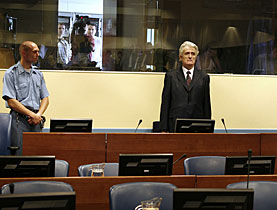
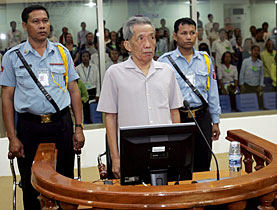
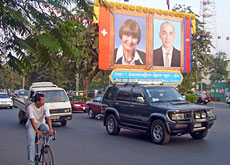
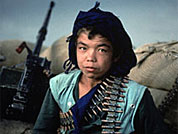
You can find an overview of ongoing debates with our journalists here. Please join us!
If you want to start a conversation about a topic raised in this article or want to report factual errors, email us at english@swissinfo.ch.